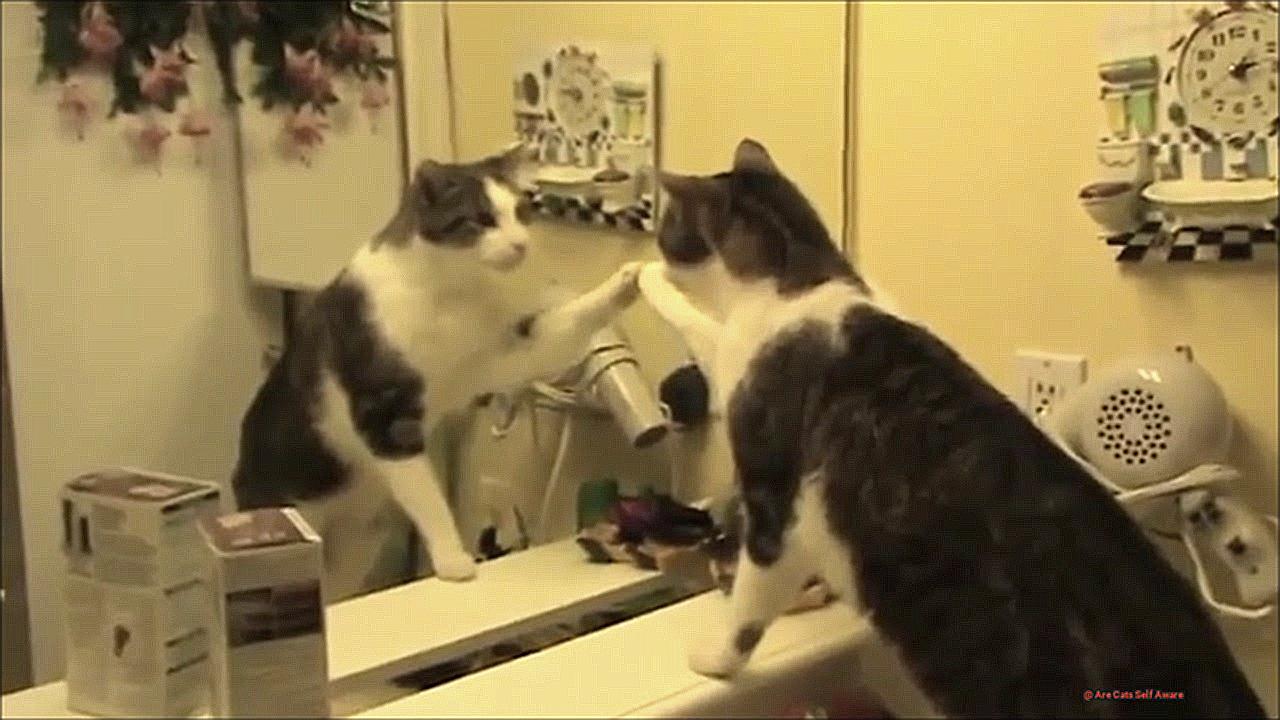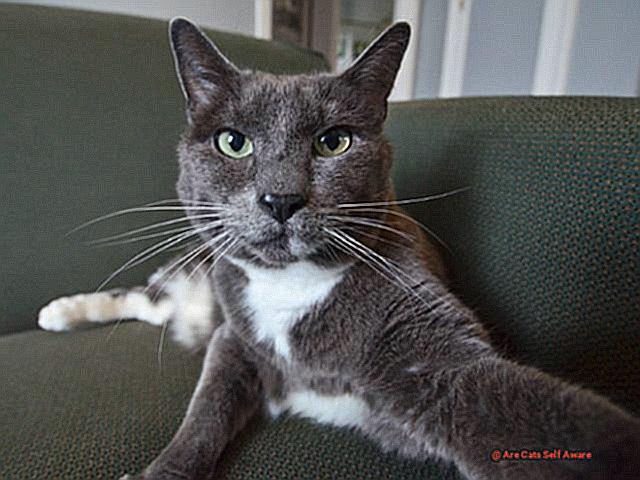Today, we’re digging into the intriguing topic of feline self-awareness. You’ve probably heard the saying “curiosity killed the cat,” but did you know that cats are actually incredibly self-aware creatures?
That’s right, our furry companions possess a level of consciousness and understanding of their own existence that may surprise you. From recognizing themselves in mirrors to showing empathy towards others, cats have proven time and time again that they are more than just cute and cuddly companions.
Trust us, you’ll never look at your cat the same way again.

Are Cats Self Aware?
Contents
As someone who has spent countless hours observing and interacting with these curious creatures, I have my own thoughts and insights on the matter. Let’s delve deeper into this ongoing debate, exploring the behavioral and brain size factors that contribute to the discussion.
Defining self-awareness
Before we can dive into the topic of cats and self-awareness, it’s important to understand what this term means. Self-awareness is the ability to recognize and understand one’s own emotions and thoughts. It is often considered a defining characteristic of humans, but some studies have shown that certain animals may also possess this trait.
The debate on self-awareness in animals
Humans are often considered the only species with self-awareness, as we are able to reflect on our own thoughts and emotions. However, studies have shown that other animals, such as dolphins and primates, also exhibit self-awareness through various experiments and observations. This raises the question – do cats also possess this ability?
Behavioral evidence for self-awareness in cats
As cat owners, we have all witnessed our feline friends grooming themselves with precision and recognizing their own reflections in mirrors. These behaviors suggest that they have an understanding of their physical appearance and existence. In fact, some experts argue that cats may possess a level of self-awareness similar to that of dogs or even young children.
Brain size as a contributing factor
One factor that may play a role in a cat’s level of self-awareness is their brain size. Compared to animals like dolphins and primates, cats have much smaller brains. This raises the question of whether their brain capacity is large enough to support complex cognitive functions like self-awareness. However, it’s important to note that brain size is not the only determining factor in intelligence or self-awareness.
The ongoing debate and the importance of continued research
While some evidence suggests that cats may possess a level of self-awareness, the debate is far from settled. There are still arguments and studies that suggest cats do not possess this ability in the same way that humans do. As cat owners, it’s important for us to continue observing and learning about our furry companions. Only through further research and understanding can we truly determine if cats are self-aware.
Humans: The Only Species with Self-Awareness?
As a cat owner, you may have found yourself wondering at some point, “Does my cat know that they are a cat?” or “Do they understand that their reflection is them?” These questions stem from the ongoing debate on whether cats possess self-awareness, a trait long believed to be unique to humans. Let’s explore this topic together and see what insights we can uncover about our feline friends.
The Brain Size Factor
One of the main arguments against cats having self-awareness is their brain size. It is often assumed that larger brains equate to higher cognitive abilities, including self-awareness. While it is true that humans have the largest brains in proportion to our body size, recent studies have shown that brain size does not necessarily determine intelligence or self-awareness.
In fact, cats have relatively large brains compared to other animals of similar size. According to a study by the University of Oxford, cats have a brain-to-body ratio that is only slightly smaller than that of primates. This suggests that they may possess cognitive abilities beyond what we initially thought.
The Mirror Test
The “mirror test” has been used as a measure of self-awareness in animals. It involves placing a mark on an animal’s body and observing their reaction when they see their reflection in a mirror. If the animal recognizes the mark as being on their own body and attempts to remove it, it is seen as an indicator of self-awareness.
While cats have been known to react to their reflection in different ways, such as becoming aggressive or ignoring it, this does not necessarily prove self-awareness. They may simply see their reflection as another cat or object. However, this test alone cannot fully determine whether cats possess self-awareness or not.
Behavior and Interactions with Environment
Cats’ behavior and interactions with their environment may provide more insight into their level of self-awareness. For example, cats have been observed grooming themselves in front of a mirror, which could indicate a sense of self-awareness and self-grooming. They may also respond differently to their own scent compared to the scent of other cats, suggesting a sense of identity and awareness of self.
Studies and Experiments on Animal Self-Awareness
How do we first describe self-awareness? It means being able to see yourself as unique and different from others, as well as knowing your own thoughts, feelings, and presence. Many people think that this idea is an important part of awareness and understanding. Then, do cats have this skill?
The mirror self-recognition test is one of the most well-known ways to find out if an animal is self-aware. Putting a mark on an animal’s body and watching how it reacts when it looks at itself in a mirror is part of this test. It is a sign of self-awareness if they know the mark is on them and try to touch it or get rid of it.
Several studies have used this test on different kinds of animals, including cats. For our animal friends, however, the effects have been unclear. Different studies have had different results when it comes to whether or not animals like dolphins, elephants, and monkeys are self-aware. Some of these studies have used cats, but the way they respond to the mirror test has not been the same every time.
Besides the mirror test, there are other ways to find out if an animal is self-aware. The body-as-an-obstacle test and the mark test are two of these. The first method involves watching how an animal reacts when it comes across an unexpected item or obstacle in its surroundings. The second method involves marking the animal and watching how it reacts.
Some experts have also done special studies on cats to find out how self-aware they are. For instance, because cats have such a good sense of smell, one study used scent marks instead of visible marks in the mirror test with them. This study suggested that cats may be somewhat self-aware, but more research is needed to fully understand how smart they are.
But it’s important to point out the problems and flaws with these studies and trials. Some people say that the mirror test might not be the best way to tell if an animal is self-aware and that there might be other things going on.
Lack of Research on Cats and Self-Awareness
As cat lovers, we all know that our animal friends are smart and have their own personalities. But have you ever thought about whether they are self-aware? Even though cats are very famous as pets, there hasn’t been a lot of study done on them, which has made it harder to understand their mental and emotional skills.
Then why isn’t there more study on cats and being self-aware? The answer is that it’s hard to tell how self-aware animals are. People can talk about their feelings and thoughts through words, but animals only use behavior and body language to talk to each other. This makes it hard to figure out how self-aware they are.
A common view is also that only very smart animals are self-aware. Many people think that cats can’t be self-aware because they think of them as cold and independent. Because of this false belief, there isn’t much interest in or money for study on the subject.
More recent research, though, has shown that cats do things that make me think they might be self-aware. For example, they can see themselves in mirrors and answer their own names. They also show concern for their masters and can guess what they will need. These results give some proof that cats may, in fact, be self-aware beings.
But it’s hard to say how much cats know about themselves without doing a lot of study in this area. Because there hasn’t been enough study, there aren’t any solid ways for cat owners to tell if their dogs are self-aware. In the end, it comes down to watching their behavior and figuring out what it means.
Behaviors That Suggest Cats May Be Self-Aware
As cat owners, we have all witnessed our feline friends exhibiting behaviors that make us wonder just how much they understand about themselves and their surroundings.
From recognizing their own names to showing empathy towards others, cats have a way of surprising us with their abilities. But do these behaviors suggest that cats are self-aware? Let’s take a closer look at the research and evidence to unravel this mystery.
Recognizing Their Own Names
One of the most common behaviors that suggest cats may be self-aware is their ability to recognize their own names. Studies have shown that cats respond more strongly to their own names compared to other words or names. This indicates that they have a sense of self and can distinguish between themselves and others. So, the next time your cat responds to their name, know that it’s not just because they want food or attention – they actually know it’s their name.
Self-Grooming
Cats are known for their meticulous grooming habits, but did you know that this behavior can also suggest a level of self-awareness? By grooming themselves, cats are able to recognize and attend to their own physical appearance, indicating a level of self-perception. So, the next time you see your cat primping and preening, know that they are not just trying to look good for you – they are also taking care of themselves.
Problem-Solving and Tool Usage
Another behavior that suggests self-awareness in cats is their ability to problem-solve and use tools. Yes, you read that right – cats can use tools. Some cats have been observed using their paws to open doors or manipulate objects in order to reach food or toys. This requires a level of self-awareness and understanding of cause and effect. So, don’t underestimate your cat’s intelligence – they may just surprise you with their problem-solving skills.
Empathy Towards Others
Cats may have a reputation for being aloof, but they actually show empathy towards others, which is another sign of self-awareness. They have been known to comfort and console their owners when they are upset or in pain, showing an understanding of others’ emotions. So, the next time your cat snuggles up to you when you’re feeling down, know that they are not just being affectionate – they are showing empathy towards you.
Counterarguments Against Cat Self-Awareness
When it comes to the topic of self-awareness, there are many arguments against cats possessing this cognitive ability. Let’s take a closer look at these counterarguments and see if they hold up against our beloved feline companions.
Argument 1: Cats are just reacting to their own reflection.
One common argument against cat self-awareness is that they do not recognize themselves in the mirror. However, studies have shown that cats can indeed recognize themselves in mirrors, but they may not show the same reactions as humans or other self-aware animals. This doesn’t mean they are not aware of their own reflection, but rather that they may not see it as a threat or something to be curious about.
Argument 2: Cats lack a sense of self-preservation.
Unlike other self-aware animals who actively protect themselves from danger, cats do not exhibit the same behavior. However, this does not mean they are not aware of their own well-being. In fact, cats have a highly developed sense of survival instincts and can quickly assess and respond to potential threats.
Some argue that cats are too independent and do not possess the same level of social cognition as other animals, making them incapable of self-awareness. However, research has shown that cats do have a level of social intelligence and can form strong bonds with humans and other animals. They may not have the same level of social cognition as dogs or primates, but this does not discount their ability for self-awareness.
Argument 4: Cats lack advanced brain structures.
Critics often point out that cats do not have the same advanced brain structures as other self-aware animals, such as the prefrontal cortex. While it is true that cats may not have the same brain structures, this does not mean they are not capable of self-awareness. Cats have evolved to thrive in their environments, and their brains are well-equipped for their survival needs.
The Role of Grooming in Cat Self-Awareness
As cat owners, we all know that our feline friends are meticulous groomers. They spend hours each day licking and grooming their fur, often with the precision and intensity of a professional beautician. But did you know that this behavior goes beyond just maintaining their physical appearance? Recent studies have shown that grooming plays a significant role in a cat’s sense of self-awareness.
So what exactly is self-awareness, and how does grooming impact it? Self-awareness is the ability to recognize oneself as an individual separate from others, and it is a crucial aspect of cognitive development. While previously believed to be limited to humans and other highly intelligent animals like dolphins and great apes, research has now shown that cats also possess a level of self-awareness.
Grooming is a natural behavior for cats, and it serves multiple purposes, including maintaining their physical appearance and promoting social bonding with other cats. However, recent studies have revealed that grooming may also play a role in a cat’s self-awareness. Let’s take a closer look at how grooming impacts our feline friends’ sense of self.
Grooming as a Form of Self-Recognition
In a study conducted by researchers at the University of Padua in Italy, cats were presented with a mirror and observed their reactions. The majority of the cats showed signs of self-awareness by making sudden movements, head tilting, and even touching their own reflection. This suggests that cats have a sense of self-recognition, which is a key component of self-awareness.
Grooming and Emotional Well-being
Not only does grooming serve as a means of self-recognition, but it also plays a vital role in a cat’s emotional well-being. A study published in the journal Applied Animal Behaviour Science found that cats who were deprived of regular grooming sessions showed signs of increased anxiety and stress. This further highlights the importance of grooming in a cat’s overall sense of self.
Conclusion
Finally, the question of whether cats are self-aware is a complicated one that experts are still arguing about. Even though there is some proof that they are self-aware, there are also good reasons why this is not the case. We do know, though, that cleaning is a very important part of a cat’s sense of self.
Just like people take care of their looks to feel good about themselves, cats clean themselves to feel good about themselves. It helps them understand who they are and keeps their mental health in good shape. You could even say that grooming is a way for them to test how self-aware they are.
So, the next time you see your cat carefully cleaning itself, know that it’s not just for looks; it’s also a way for them to connect with and understand their own life. As cat fans, let’s keep watching and learning about these interesting animals and enjoying their unique traits and actions. We may one day have a clear answer to the question of whether cats really are self-aware or not.






